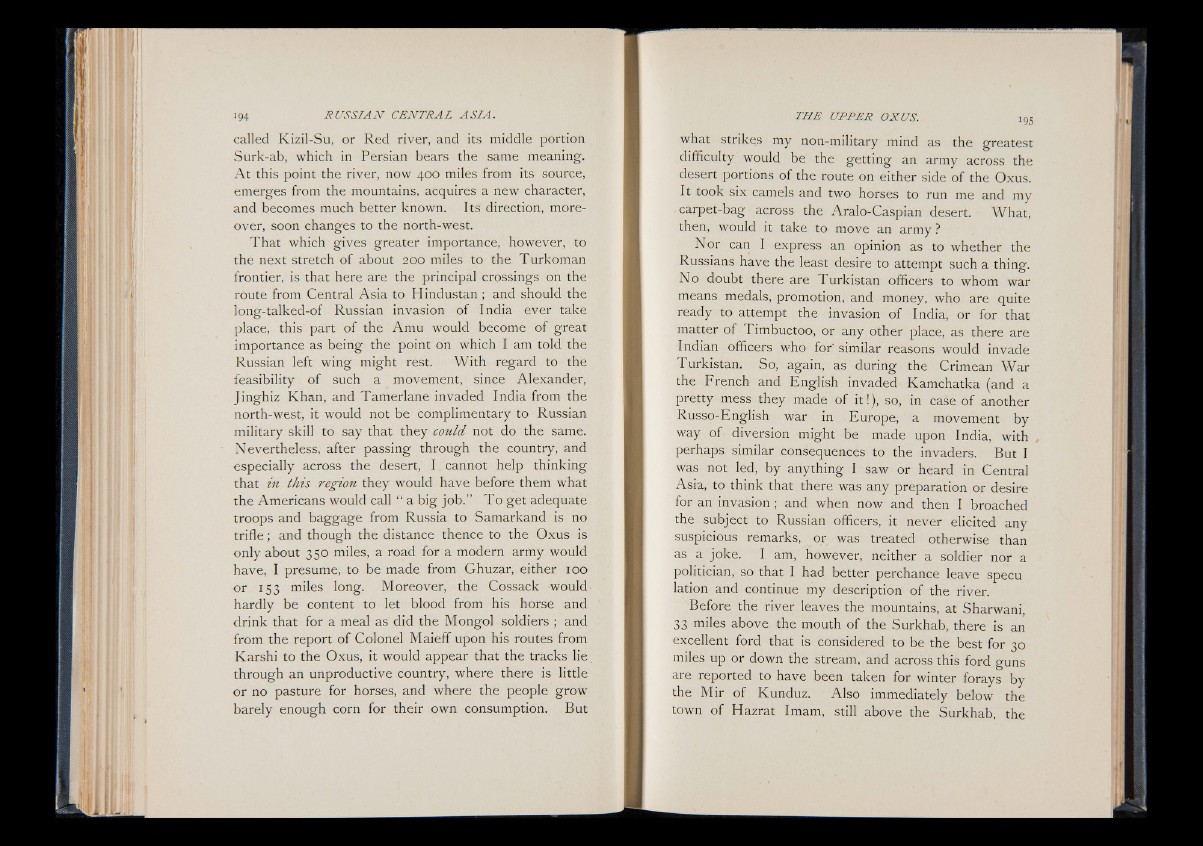
called Kizil-Su, or Red river, and its middle portion
Surk-ab, which in Persian bears the same meaning.
A t this point the river, now 400 miles from its source,
emerges from the mountains, acquires a new character,
and becomes much better known. Its direction, moreover,
soon changes to the north-west.
That which gives greater importance, however, to
the next stretch of about 200 miles to the Turkoman
frontier, is that here are the principal crossings on the
route from Central Asia to Hindustan ; and should the
long-talked-of Russian invasion of India ever take
place, this part of the Amu would become of great
importance as being the point on which I am told the
Russian left wing might rest. With regard to the
feasibility of such a movement, since Alexander,
Jinghiz Khan, and Tamerlane invaded India from the
north-west, it would not be complimentary to Russian
military skill to say that they could not do the same.
Nevertheless, after passing through the country, and
especially across the desert, I cannot help thinking
that in this region they would have before them what
the Americans would call “ a big job.” T o get adequate
troops and baggage from Russia to Samarkand is no
trifle; and though the distance thence to the Oxus is
only about 350 miles, a road for a modern army would
have, I presume, to be made from Ghuzar, either 100
or 153 miles long. Moreover, the Cossack would
hardly be content to let blood from his horse and
drink that for a meal as did the Mongol soldiers ; and
from the report of Colonel Maieff upon his routes from
Karshi to the Oxus, it would appear that the tracks lie
through an unproductive country, where there is little
or no pasture for horses, and where the people grow
barely enough corn for their own consumption. But
what strikes my non-military mind as the greatest
difficulty would be the getting an army across the
desert portions of the route on either side of the Oxus.
It took six camels and two horses to run me and my
carpet-bag across the Aralo-Caspian desert. What,
then, would it take to move an army ?
Nor can I express an opinion as to whether the
Russians have the least desire to attempt such a thing.
No doubt there are Turkistan officers to whom war
means medals, promotion, and money, who are quite
ready to attempt the invasion of India, or for that
matter of Timbuctoo, or any other place, as there are
Indian officers who for' similar reasons would invade
Turkistan. So, again, as during the Crimean War
the French and English invaded Kamchatka (and a
pretty mess they made of i t !), so, in case of another
Russo-English war in Europe, a movement by
way of diversion might be made upon India, with
perhaps similar consequences to the invaders. But I
was not led, by anything I saw or heard in Central
Asia, to think that there was any preparation or desire
for an invasion ; and when now and then I broached
the subject to Russian officers, it never elicited any
suspicious remarks, or was treated otherwise than
as a joke. I am, however, neither a soldier nor a
politician, so that I had better perchance leave specu
lation and continue my description of the river.
Before the river leaves the mountains, at Sharwani,
33 miles above the mouth of the Surkhab, there is an
excellent ford that is considered to be the best for 30
miles up or down the stream, and across this ford guns
are reported to have been taken for winter forays by
the Mir of Kunduz. Also immediately below the
town of Hazrat Imam, still above the Surkhab, the